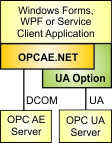OPCAE.NET-UA
OPCAE.NET-UA Product DescriptionReference ManualVersion Log

OPC UA option for the OPC AE (Alarms&Events) Client SDK for C# and VB.NET
The OPCAE.NET-UA client development toolkit extends the OPCAE.NET Client Component with an OPC UA (Unified Architecture) wrapper. The application can access OPC AE and UA-AC servers through the same API.
OPCAE.NET based client applications become OPC UA-AC clients without having to be modified. The applications only need to be compiled with a reference to the OPCAE.NET component with the UA option.
Depending on the server ID ProgID or URL), the server is either accessed as an OPC AE DCOM server or an OPC UA-AC server.
For UA server access DCOM is completely eliminated because the UA converter is within the client process. There is no external DCOM to UA wrapper server involved. The client application acts as a native OPC UA-AC client.
Without additional application development effort the application can access DCOM OPC DA server and OPC UA-AC servers.
OPCAE.NET-UA Advantages
- The OPCAE.NET-UA component enhances existing OPCAE.NET based OPC Alarm&Events client applications with the capability to access OPC UA-AC servers.
No code changes are required in the OPC AE application. Only the OPCAE.NET assembly references need to be changed to the assembly version with UA support and the OPCAENetUaOption.dll needs to be additionally referenced. - New client applications can be developed to support access to Classic OPC AE servers as well as OPC UA servers.
For UA server access DCOM usage is completely eliminated, unlike solutions with an external UA proxy server.
With the client application able to access OPC AE and OPC UA-AC servers there is no need for external converters. This simplifies the installation, the configuration and the maintenance of the application. No converter (UA proxy) module needs to be installed, configured and maintained. There is one less component that may fail.
Top performance is achieved. The application communicates directly with the server. For OPC AE server access there is an efficient .NET wrapper that handles the DCOM interface. For UA server access the .NET code performs the WCF based UA communication through the OPC UA communication stack.
OPCAE.NET-UA Limitations
The UA server access is limited to the Alarm&Conditions (AC) profile of the UA server. The Data Access (DA) and Historical Access (HA) features of the UA server cannot be accessed through the OPC AE client interface.
If also DA fuctionality is required then the OPCDA.NET / OPCDA.NET-UA products need to be used in combination with OPCHDA.NET /OPCHDA.NET-UA.
If also HDA fuctionality is required then the OPCHDA.NET / OPCHDA.NET-UA products need to be used in combination with OPCDA.NET /OPCDA.NET-UA.
OPCAE.NET-UA Feature Summary
- .Net applications can access OPC AE and OPC UA servers through the same API
- All OPCAE.NET classes can access Classic OPC AE and UA servers.
- The server type is determined by the server name (ProgID or URL).
- The UA configuration is defined in an additional configuration XML file.
- UA specific configuration and testing tools are provided.
- Detailed UA errors can be logged to file or the application can define a callback method for UA error/trace information.
- High performance for AE and UA server access.
- Pure .NET code that runs in 32-bit or 64-bit for AE and UA server access.
- UA Methods handling
Requirements
- OPCAE.NET Professional Edition V11.1
- Windows 8, 10 or Windows Server 2012, 2016 32 or 64bit
- .NET Framework 4.7.2 or .Net5 (NetCore)
- Visual Studio 2015, 2017 or 2019, C# or Visual Basic
- Visual Studio 2019 V16.9.3 or newer for NetCore
